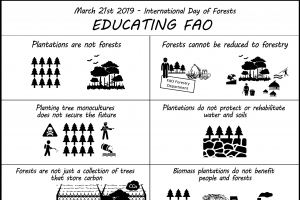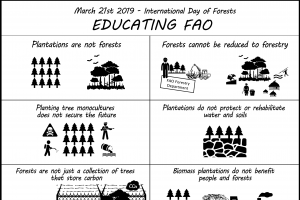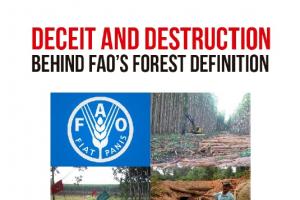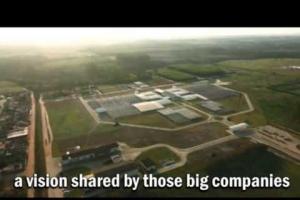FAO , chose Forests and Education as the theme for 2019 and underlines the importance of investing in forest education. But what does FAO mean by “forest education”?
21/03/2019
In 2012, the UN General Assembly proclaimed March 21st the International Day of Forests. The aim: raising awareness about the importance of forests. The UN Food and Agriculture Organisation (FAO), the organizer of the Day, chose Forests and Education as the theme for 2019 and underlines the importance of investing in forest education. But what does FAO mean by “forest education”? Based on what WRM has learnt from communities, FAO ought to reflect on –at least- the following 10 points:
1. Plantations are NOT forests
FAO’s forest definition considers forests to be basically just “a bunch of trees”. This ignores the vital interconnections with other life forms. With this definition, FAO has actively promoted the establishment of many millions of hectares of industrial tree plantations, of mainly alien species, especially in the global South.
2. Forests cannot be reduced to forestry
The terms “Forestry” and “Forests” may sound similar and are sometimes used interchangeably, but they refer to very different things. Forestry reduces forests to their potential for wood production. Hence, FAO argues that you can “plant” forests. The reality is that it is only possible to plant trees. When FAO created a “Forestry department” (and not a Forest department) it shows that the “forestry” concept has priority in its policies.
3. Planting tree monocultures does NOT secure the future
FAO’s message during the International Day of Forests in 2013 was “plant a tree, plant our future”. But whose future? The large-scale monocultures which FAO promotes threaten the life of rural communities because they have devastating impacts, such as invasion of fertile community lands, massive water consumption and use of toxic inputs. They are a driver of deforestation and a false solution the climate crisis.
4. Plantations do NOT protect or rehabilitate water and soils
FAO spreads the message that tree monoculture plantations can “provide a number of social and environmental services”, including “soil and water protection”. However, when FAO chose the theme of Forests and Water for the 2016 International Day of Forests, its video only showed forests. The video intentionally excluded images of industrial tree plantations that deplete water sources and degrade soils.
5. Forests are NOT just a collection of trees that store carbon
International climate talks have reduced forests to a mere carbon store. FAO promotes this reductionist vision. Its 2015 International Day of Forests emphasized the role of forests and trees as merely a store of carbon. This concept paved the way for forest carbon programmes that grab forests and criminalize forest-dependent communities. The only safe and urgent solution to the climate crisis is leaving fossil fuels underground.
6. Biomass plantations do NOT benefit people and forests
FAO’s documents argue that “forestry”, done well, “will provide multiple benefits, including improved energy production”. But large-scale biomass energy plantations destroy peoples’ land and forests while benefiting corporate interests. The question about “improved energy production” is therefore: for what and for whom?
7. Industrial tree plantations increase harassment and sexual violence against women
Among the invisible impacts of industrial tree plantations and industrial logging are harassment and sexual violence against women. Although FAO has produced some relevant documents on women and forests, these do not address this abuse against women.
8. Sustainable Forest Management (SFM) does NOT stop forest loss
FAO claims it is helping countries to “manage their forests in a sustainable way”. Yet, the old destructive industrial logging model is hiding behind FAO's concept of SFM. By giving support to SFM, FAO -as well as certification schemes like the FSC- allows industrial logging to continue.
9. The plantation industry is NOT a good advisor for taking care of forests
FAO receives advise from the so-called Advisory Committee on Sustainable Forest-based industries. Its members come mainly from the tree plantation industry, which is responsible for deforestation and land grabbing.
10. Forest-dependent communities know how to take care of forests
Communities that depend on forests have a deep knowledge about them. FAO must relearn about forests and the harmful impacts of the tree plantation industry from forest-dependent communities and other communities affected by this industry.
What else do you think FAO should learn about forests?
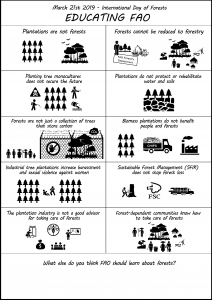
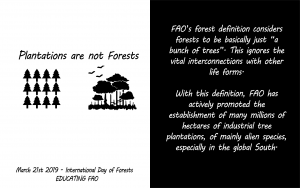
Comic and shareables
Click here to download the shareables


Other information
18 March 2019
FAO chose Forests and Education as the theme for 2019 and underlines the importance of investing in forest education. But what does FAO mean by “forest education”?
Publications
21 March 2018
Compilation of WRM Bulletin articles on the occasion of March 21st – UN International Day of Forests
Multimedia
21 March 2016
On the 21st of March, International Day of the Forests, the FAO has launched another nice video. This year the video is about forests and water. Did you notice the video does not include any monoculture tree plantations, even though FAO considers them as forests? How would look such a video if coherent with FAO´s forest definition?
Multimedia
20 March 2015
This two-minutes video is a rebuttal of the one-minute video produced by FAO for International Day of Forests.
The video aims to challenge the FAO video for March 21, which narrowly and erroneously views forests as if they were a “storage facility” for wood and carbon.
width="480" height="360" frameborder="0" allowfullscreen="allowfullscreen">
Publications
10 November 2011
When we talk about “the definition of forest”, what is perhaps most striking is the fact that, although there are many definitions of the word “forest” in different parts of the world, there is one definition viewed as more official and international, to which many national governments, institutions and other bodies and organizations adhere. This is the definition of forest developed by FAO, the Food and Agriculture Organization of the United Nations.
